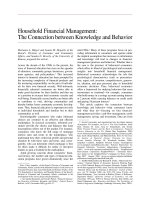TOPIC: The connection between learning a language and understanding its culture
Bạn đang xem bản rút gọn của tài liệu. Xem và tải ngay bản đầy đủ của tài liệu tại đây (59.03 KB, 7 trang )
HUE UNIVERSITY OF FOREIGN LANGUAGE
ENGLISH DEPARTEMENT
CROSS- CULTURE COMMUNICATION
END OF TERM ASSIGNMENT
Instructor: Nguyen Bach Nga
Student: Ha Thi Ngoc Diep
Student code: 14f7511061
Class: 10
Hue, June 2017
TOPIC: The connection between learning a language and understanding its culture.
Nowadays, learning foreign languages is very important. Foreign language has helped
open the way for many people, especially young people. Now, the goal of learning a
foreign language is to develop effective communication skills. However, learning a
language without understanding and grasping native culture is difficult to understand indepth to communicate successfully with native speakers. So integrating the culture of the
target language into the learning process is extremely important.
To hark back to the relationship between language and culture; Samovar, Porter, & Jain
(1981: 24) observe: Culture and communication are inseparable because culture not only
dictates who talks to whom, about what, and how the communication proceeds, it also
helps to determine how people encode messages, the meanings they have for messages,
and the conditions and circumstances under which various messages may or may not be
sent, noticed, or interpreted... Culture...is the foundation of communication. In fact,
Language and culture are two indispensable elements. Language is a way for people to
communicate with each other, exchange ideas and come to understand each other. Each
language is associated with the specific characteristics of that national culture. Language
can be seen as a cultural expression. It is used to maintain and communicate culture.
Language allows people to express their thoughts in different groups of words which
derived from life and accumulated over generations. We will not be able to use a language
without grasping the characteristics of a culture and conversely we cannot understand the
subtle nuances and profound meaning of a culture without understanding it. Clear about
the language. Therefore, for learners who study of foreign languages, the parallel
development of language skills such as vocabulary, grammar,... must also improve the
understanding of the culture of the nation to be able to promote communicate in their new
language in the best.
Moreover, given Duranti’s (1997: 24) definition of culture as ‘something learned,
transmitted, passed down from one generation to the next, through human actions, often in
the form of face-to-face interaction, and, of course, through linguistic communication’, it is
patently obvious that language, albeit a subpart of culture, plays a pivotal role. Bourdieu
has emphasised the importance of language not as an autonomous construct but as a
system determined by various socio-political processes. For him, a language exists as a
linguistic habitus (see Bourdieu, 1990: 52), as a set of practices that imply not only a
particular system of words and grammatical rules, but also an often forgotten or hidden
struggle over the symbolic power of a particular way of communicating, with particular
systems of classification, address and reference forms, specialized lexicons, and metaphors
(for politics, medicine, ethics) (Bourdieu, 1982: 31, cited in Duranti, 1997: 45) no matter
how you have good grasp of grammar and rich vocabulary if you lack of understanding of
native culture, when communicating you just stop at the level of knowing how to express
their ideas clumsily. Understanding these cultural factors helps communicators and
learners acquire foreign languages effectively because of the meaning of the word, the
content of speech in any language can change in each context. Language perception does
not only just stop at the meaning of words, knowing the content contained in words but
also more importantly grasp the deep meaning of the content of information. In addition,
the problem may be more serious if the lack of understanding of culture can cause "cultural
conflict" or "cultural shock". Most of the students often imprison their mother tongue in
learning their foreign language. For example, in Vietnam, familiar questions such as: "Do
you married?", "How old are you?", "How much salary?" ... it seemed normal, but for
people in The West it is not very courteous and should be avoided. Each and every nation
is deeply rooted within its own culture. The culture makes each country very special and
different from one another, so does the person belong to a particular culture. Therefore the
role of the culture in the process of national progress is unquestionable. The way we are
brought up and our personality is built up has a lot to do with the culture. Therefore culture
means a lot to the nation as well as to the people. It is a fact that we always prefer to hold
on to our culture as we attach an emotional component to our culture. Therefore one can be
easily offended in cultural issues. It is very difficult for a person to understand and get
adapted to another culture in case the situation demands. So that when we visit
a foreign nation, one of the difficulties we encounter is the cultural issue. Due to our way
of living, customs and manners change completely and it becomes a novel experience to
us. Sometimes we get confused regarding what to adopt and what not. Some times when in
the foreign country, we are forced to adopt certain manners which are exact opposite to our
idea of culture, as a way of showing civility. So it can cause a lot of discomfort to
us, especially with a person who is very new to the country. Therefore it paves the way for
a cultural shock for the individuals new to the country.
On the other hand, Misunderstandings can happen in all communication especially
when people from the different cultures communicate. Of course, the big problem here is the
difference in culture. I would like to mention about some possible reasons leading to
misunderstandings. I think the biggest barrier in communication is language and this is also
the most popular reason of misunderstandings. Though English is the international language
and lots of countries all over the world use it as the national language, it is not the only one.
Numerous countries like Vietnam, China, Japan, Korean and so on use their own language.
The difference in language will lead to a situation that people will not understand or
understand in another way what the opposite says. Even when they use the same language
as English, there are still misunderstandings because of slang, jargon, dialect. In
communication, people actually use some actions and gestures to explain what they are
saying or express their attitude toward to the opposite. And the misunderstandings occur
when people from a country use a specific gesture to describe their opinion, the opposite can
misunderstand or even be angry if that gesture is impolite in the opposite’s country. The
next reason is lack of basic knowledge about the concerning issue of one side. This reason
may also base on the literacy when the people from different countries talk together, there
are a lot of subject that make some of them embarrassing or hard to understand because of
their knowledge. If the topic especially is about a specialized matter, it requests the
participant have a certain knowledge to understand. Another possible reason is that the
people from the different cultures will have the difference in awareness of a specific matter.
It is hard for everyone to have a unified ideology in conservation. Therefore,
misunderstands are unavoidable. The last possible reasons is that the ways people using
their tone of voice to express their opinion instead of talking directly. I think it is very
difficult to understand what another says through their tone of voice. From those reasons, I
would like to suggest some ways to avoid misunderstands in communication and prevent
them from turning into cultural conflicts. Before starting the conversation, I think people
should look at the cultural background of another to get some basic information. It is very
necessary for a successful conservation. During the conservation, everything they say must
be clear and concise to make sure that everyone can understand easily. They should speak
slowly and use short and simple sentences in order to everyone can follow what they says.
Besides, they shouldn’t use slang, jargon, dialect or ambiguous languages or double
negatives. All of them are easy to make people misunderstand. They should give
paraphrases or demonstrations when giving a new subject. During that process, gestures and
actions added to conservation must be polite and appropriate for everyone. In addition, they
shouldn’t mention to specialized matter if they don’t have the same specialized knowledge.
If any one doesn’t really understand, they must explain carefully. They should avoid raising
their tone of voice to express their opinion and try to introduce it directly. One more thing is
that they should find out the similarities between their cultures to lead their conversation in
a certain direction.
I remember a conservation between my American guest and me when I did as a rider
from Hoi An to Hue last two weeks. Do you remember about the General Election last
week? When my guest saw the posters about the Election, they asked me for more details. I
said that I would take part in Election as a voters so she wanted to know the way I would
elected. Because of her country, the presidential election happens and she wonders if both
elections were the same. In fact, I just knew a little about it and I didn’t how to explain for
her to understand. I have told some little rules that I knew but I’m not sure if she could
understand clearly. After that, she also show me the ways of American presidential election.
She said about the Parties, its campaign, the voted rates and the election rules. However, I
can’t understand completely about it because I didn’t prepare for this situation. Generally, I
just have basic tourism knowledge and some social knowledge to do as a rider. I don’t find
out too much about Election. Therefore, I was so confuse when my guest asked about
election. When my guest recognized my problem, she decided change another topic.
It’s very clear from the above discussion that culture and language are intricately
interwoven so that one cannot separate the two without losing the significance of either
language or culture. Cultural influences on foreign language teaching. In my opinion, the
best way to avoid all problems in communication is contact with as many cultures as
possible. To understand the importance of culture we need to know to what extent cultural
background, knowledge influences language learning and teaching, and how can we take
advantage of that influence. To account for the roles culture plays in language learning and
teaching, it is necessary to demonstrate the functions it may perform in the components of
language learning and teaching, such as listening, speaking, reading, and translating.
Throughout, we can learn not only about their cultures but also about the ways they
communicate with others. It will help us to avoid misunderstanding in communication with
others and raise our own knowledge.
If any one of them is separated the other remains incomplete so that the students need
acquire the target language with cultural background and correspond in real life situations.
Now we understand the importance of cultural factors in learning a foreign language. The
question is how to learn to be effective and how to find sources of data which appropriates
for different levels of each person. The solution is to find modern foreign language
teaching materials that integrate the cultural features of a people into the lessons. In
addition, you can find more articles on foreign cultures through foreign language journals
or other types of books.









